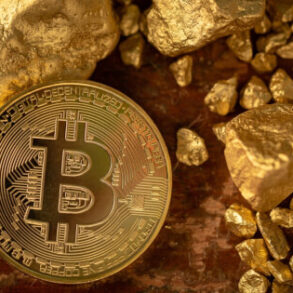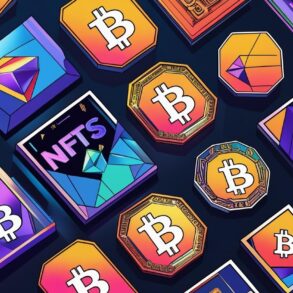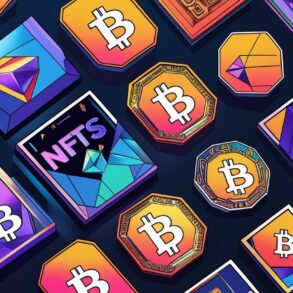Another year, another luxury art auction that sells off some gimmicky work for stupid amounts of money—and another crypto (con) artist at one end of the process.
Late last month, an infamous 5-year-old artwork titled Comedian, which consists solely of one (1) banana attached to a gallery wall via a single strip of duct tape, was sold off by Sotheby’s for a whopping $6.2 million—up from the $1.5 million asking price it commanded pre-auction. (Cue the inevitable Arrested Development references.) The lucky new owner? Chinese cryptocurrency maven Justin Sun, who has since eaten the art.
On the surface, it’s a funny curiosity of a story that would normally take up just enough of the news cycle for viewers to jab their thumbs and mutter to one another, “Can you believe this shit?” But Justin Sun’s involvement here takes this beyond the realm of mere amusement and into something far more insidious: a yearslong saga of skimping on international law, funneling ill-gotten wealth and splurging ostentatiously, abusing employees, becoming the subject of government investigations, plagiarizing white papers, and sucking up to President-elect Donald Trump for the sake of rewiring American financial regulation as we know it. It’s a literal pay-for-play, with Sun announcing just one day after the banana stunt that he would invest $30 million in Trump’s crypto scheme, World Liberty Financial, and bail it out of financial insolvency, earning an advisory role with the firm in the process.
The banana is not just a sideshow distraction for Sun on this execrable journey; it is very much part and parcel of his drive for wealth and power, as evidenced by how vocally he compared Comedian to NFTs and blockchain entries while eating the thing. There are many reasons why Justin Sun is so notorious within the crypto world, even though he remained mostly unknown to the wider public before now. So let’s break down why this whole thing stinks … kinda like a rotting banana.
So, what’s Justin Sun’s whole deal?
Justin Sun is a 34-year-old digital entrepreneur, born and raised in China, who got interested in the burgeoning world of cryptocurrencies after moving to the U.S. in the early 2010s to study for a master’s degree. He invested in Bitcoin and worked for Ripple—best known these days as the company that both successfully constricted the SEC’s crypto regulation abilities in court and poured so, so much money into the 2024 election—before funding his own ventures. Back in China, Sun launched Tron in 2017 as an open-source blockchain network similar to the Bitcoin alternative Ethereum, and raised $70 million for the venture through an initial coin offering, or ICO. (This is an unregulated method for crypto startups to raise initial investment by selling virtual “tokens” instead of regulated shares.)
Now, China was about to crack down on ICOs for a good reason: They were a perfect instrument for rampant scamming, and the Chinese government didn’t care for that. Conveniently, Sun managed to wind down Tron’s ICO just before China implemented its ban.
Sun then moved to the U.S., and in June of 2018, Tron acquired the iconic peer-to-peer protocol BitTorrent, making him CEO of the company that had facilitated so much media piracy and transforming it into a more crypto-ready platform, with its own native token and all. By this point, more people were scrutinizing Sun.
On Twitter, Ethereum founder Vitalik Buterin directly accused Sun of plagiarizing from his crypto white papers, which Sun denied. In 2019, CoinDesk reported on an independent analysis that found the overwhelming majority of activity on Tron’s blockchain was related to gambling apps that even operated in countries where they were illegal, like Japan, and appeared to be personally backed with money from Sun himself. A series of scams and scandals continued to rock both Tron and Sun that year, from a multimillion-dollar Chinese Ponzi scheme that was linked to Tron and led to a victim’s suicide (as well as governmental investigation) to a botched Tesla giveaway that Sun had ironically spearheaded in an effort to encourage “transparency, reliability and openness about blockchain”—and, well, to promote Tron by getting people to sign up and invest their funny money.
Seems like quite the character!
And we haven’t even gotten to Tron’s most significant controversies, some of which revolve around its in-house token, Tronix (TRX). In a 2020 profile of Sun for the Verge, journalist Christopher Harland-Dunaway detailed all sorts of unseemly testimonies—allegations of workplace abuse that included “actual physical violence,” stories of his existing connections with Chinese government officials—but perhaps the most ominous may have been Sun’s response to an anonymous staffer’s question about what could happen if TRX’s value drops to zero: “Whoever asked this question, we’re going to track them down … to kill their entire family.”
In a follow-up profile published two years later, Harland-Dunaway included stories of Tron employees who encouraged staffers “to buy TRX when his team knew that Tron was planning to announce good news to the public. After Tron made the announcement, the token’s value shot up, and they sold at a major profit.” Yes, a straight-up pump-and-dump scheme “to make sure the TRX price is at some level Justin wants.”
Sun also reportedly wanted TRX to not be classified as a financial security, which would force him to register the token with the Securities and Exchange Commission and be subject to its regulations. Inevitably, Sun and his companies would be charged by the SEC in 2023 for manipulating the market value of TRX and for paying off celebrities like Lindsay Lohan and Jake Paul to shill that token sans appropriate disclosure. (The case is ongoing, though it is likely to be dropped by a Trump administration SEC. Sun is certainly happy about the impending departure of the SEC’s crypto-aggressive head, Gary Gensler, and he’s already celebrating a “friendly” U.S. market for crypto under Trump, which will allow for far more financial speculation schemes of the kind Sun specializes in.)
What else happened to Sun in 2023? Well, two other crypto exchanges he just so happens to own got hacked, losing $120 million and $115 million, respectively. And Tron just happened to host 45 percent of all criminal crypto transactions around the world that year, according to a report by TRM Labs.
There are so, so many more Justin Sun stories we could dive into here, but let’s just cap this off with some 2024 lowlights: There were sanctions against Sun’s businesses by fellow players in the crypto industry, flailing attempts to keep more crypto businesses aloft, and Sun’s appointment as prime minister of a fake country that claims to use Bitcoin as its currency.
That’s all bananas. But what about the banana? Why did he go for it?
Justin Sun likes not just accumulating wealth but showing it off, especially through splashy purchases. Throughout 2021, as the NFT boom converged with a post-pandemic art-market rebound, Sun joined the crypto die-hards paying gobs of money for digital works to try to legitimize NFTs and live like art-hoarding kings on the blockchain. Sun went on to drop $100 million that year on both NFTs and IRL art by Picasso and Warhol, among others.
It probably didn’t take much sniffing for Sun to discover Comedian, which became immediately controversial after it debuted at Art Basel Miami in 2019 and sold for up to $150,000, marking creator Maurizio Cattelan’s first art-fair entry in 15 years. (Fun fact: Another one of Cattelan’s most notorious works is a golden toilet that actually interoperated with the Guggenheim’s plumbing system in 2016 and was offered to Trump’s White House in 2018.)
Where did the banana even come from?
Well, it depends on which of Comedian’s many bananas over the years that you’re referring to (for obvious reason, gallerists have had to cycle through many). The banana sold to and eaten by Sun was purchased the day of the auction by a Sotheby’s representative, who bought it for 35 cents from a Bangladeshi immigrant who works at a fruit stand right in front of the Manhattan auction house. Per a New York Times report, seller Shah Alam didn’t know about the auction until a couple of days after the sale and explained that he “had never seen this kind of money,” as he lives in a shared basement apartment in the Bronx and doesn’t even own the stand he helps operate for 12 hours a shift.
Sun, who paid for the banana in cryptocurrency, appears to have been moved by Alam’s story, offering to “buy 100,000 bananas from his stand” and distribute them for free. Alam and the fruit-stand owner don’t appear to care much for this idea, explaining to the Times that buying 100,000 bananas in bulk would be logistically difficult and expensive enough to crowd out any potential profit opportunity. Nevertheless, Sun appears to have employed Tron in service of this banana purchase-and-distribution effort.
What’s next for Sun?
Sun’s X posts in the days following the banana-stand affair have mostly focused on a memecoin operation called “SunPump,” and his pinned tweet shouts out his investment in Trump’s crypto operation, World Liberty Financial, alongside the claim that “TRON is committed to making America great again and leading innovation.”
Here’s a fun fact about that World Liberty Financial investment: Per Bloomberg, the company’s crypto “sales fell 93% short of the goal, so low they failed to hit the minimum required to trigger a payout to Trump.” So guess what Sun’s $30 million investment did? It got token sales over that minimum, which entails a $15 million payout to Trump and his adult sons. While Sun claims not to have personally met any Trump family members, he will try to seek out Eric Trump in Abu Dhabi next week, when the Gulf city will host the Bitcoin MENA conference. I’m sure those two will have some very productive conversations!
This post was originally published on this site be sure to check out more of their content









